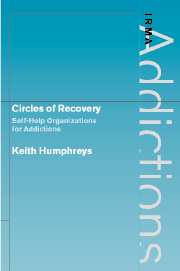Book contents
- Frontmatter
- Contents
- Acknowledgements
- 1 Definitions, scope, and origin of the health-related self-help group movement
- 2 An international tour of addiction-related mutual-help organizations
- 3 Does self-help group participation lead to positive addiction-related, psychiatric, and medical outcomes?
- 4 A different perspective on change in self-help organizations: spirituality, identity, life stories, friendship networks, and politicization
- 5 How should government agencies, healthcare organization, and clinicians interact with self-help organizations?
- Epilogue: summing up, moving forward
- References
- Index
Epilogue: summing up, moving forward
Published online by Cambridge University Press: 31 July 2009
- Frontmatter
- Contents
- Acknowledgements
- 1 Definitions, scope, and origin of the health-related self-help group movement
- 2 An international tour of addiction-related mutual-help organizations
- 3 Does self-help group participation lead to positive addiction-related, psychiatric, and medical outcomes?
- 4 A different perspective on change in self-help organizations: spirituality, identity, life stories, friendship networks, and politicization
- 5 How should government agencies, healthcare organization, and clinicians interact with self-help organizations?
- Epilogue: summing up, moving forward
- References
- Index
Summary
Some answers for the Martian
This volume opened with a hypothetical visitor from Mars who, knowing nothing of human ways, was struck by the disparity between the widespread use of addiction-related mutual-help organizations and the comparatively low level of interest shown in them by scientists, clinicians, and policy makers. The Martian asked whether anything was known about what self-help organizations are and where they come from, what effects they have, and how professionals might interact with them. This book had to scour a wide range of disciplines and countries to assemble a respectable amount of scientific findings relevant to these questions, but provides what the author hopes are informative answers to each of them. The preliminary nature of some of these answers underscores how much remains to be learned about addiction-related mutual-help organizations and their interactions with clinicians, treatment agencies, healthcare systems and governments. This epilogue briefly touches on some of the main conclusions of the book as well as important unanswered questions that require attention in the future.
What are addiction-related self-help organizations and where do they come from?
Mutual-help organizations for addiction must be understood in the context of a much larger self-help group movement in the modern world, as explored in Chapter 1. Both addiction- and non-addiction-related mutual-help organizations are voluntary associations operated by peers who share a problematic status, rely upon experiential knowledge, value reciprocal helping, do not charge fees, and include personal change among their organizational goals.
- Type
- Chapter
- Information
- Circles of RecoverySelf-Help Organizations for Addictions, pp. 177 - 181Publisher: Cambridge University PressPrint publication year: 2003

